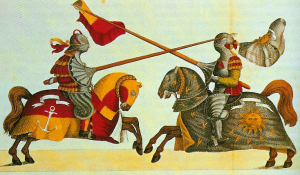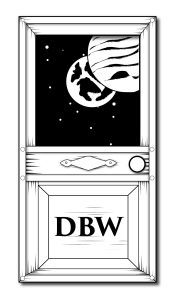 Today, we will witness the epic battle between those who use u in their words and those who don’t.
Today, we will witness the epic battle between those who use u in their words and those who don’t.
One of my readers asked whether to use -o or -ou in color / colour. Both of these options are correct. American spelling favors the use of -o, while British spelling favours -ou. As a Canadian, I follow British spelling in my personal writing. But I’m used to seeing American spelling in books (even in some of my grade school spelling textbooks, which caused no end of grief for my teachers). If I were writing something strictly for an American audience, I would use -o.
One of my resource books, Editing Canadian English, has a handy list of all the words that have this -o / -ou difference. This book also points out how the u in -ou is dropped when suffixes like -ize and -ous are added to the end of a word. So we can argue about the spelling of vapor vs. vapour, but vaporize is always spelled without the u. It’s the same thing with humor vs. humour and humorous.
While looking into this question, I found a fascinating article about the origin of -o in American spelling. It seems we can blame Noah Webster of Webster’s Dictionary fame for deliberately introducing this spelling difference as a political statement. It boggles the mind that without the actions of this one man, we might all be spelling these words with -ou today.
And now for the fun part: Today’s story challenge, where I will attempt to use all of these contested words in — what else? — a story of knightly combat.
Sir A and Sir B may have been neighbors, but their demeanor as they faced each other on the tournament grounds was anything but favorable.
Sir A insisted that the harbor was part of his territory. Through the rigor of his labors, he had discovered that Sir B’s claim to this vital port was nothing but vapor.
Sir B complained with fervour that Sir A should not generate false rumours of ownership. He said that if Sir A had endeavoured to be honourable, Sir B would not have been forced to don his armour and prove his claim against Sir A on the battlefield.
As they started to fight, the clamor of the crowd rose, adding to the noise of the colorful pennants that fluttered and snapped in the wind. Many in the audience savored the odor of the meat pies that were being sold with vigor by the bakers to succor them. But they were even more hungry for blood.
 Sir A and Sir B fought with valour. Their behaviour was knightly; they laboured to avoid the parlour tricks used by amateurs. As the fight continued, they grew to admire the splendour of each other’s combat techniques. Their ardour to confront each other waned. They realized that they were a perfect match for each other, and that there would be no winner in this fight.
Sir A and Sir B fought with valour. Their behaviour was knightly; they laboured to avoid the parlour tricks used by amateurs. As the fight continued, they grew to admire the splendour of each other’s combat techniques. Their ardour to confront each other waned. They realized that they were a perfect match for each other, and that there would be no winner in this fight.
Eventually Sir A called for a halt. “I cannot defeat you,” he said to Sir B with admirable candor.
“And it seems I cannot defeat you,” said Sir B with humour.
“Shall we conclude, then, that there is no glamor in this fight, and we should both withdraw?” asked Sir A.
“Gladly,” said Sir B.
The crowd booed and swelled down from the stands like a tumor, clearly meaning violence. Luckily the Queen was the saviour for the knights that day, and declared that honour was satisfied.
Sir A and Sir B decided to settle their remaining differences among the arbour, over a grand picnic lunch purchased at a discount from the disgruntled bakers.
***
Image from Wikimedia Commons
This post is dedicated to Nimmi. Thanks for reading!
Stay tuned for tomorrow’s post, where I will vivisect the villainous letter V…
© Sue Archer and Doorway Between Worlds, 2015

Interesting! Is the U dropped from honour when it’s honorary? Or is it still honourary?
I suppose it gets dropped, because of the suffix.
LikeLiked by 1 person
Honorary and honorific drop the U, but honourable keeps it.
LikeLiked by 1 person
I remember a book event where the author said he had wanted to use the word “colours” in his title. His publisher had persuaded him against it, and the author asked why we thought that was. I was first to the answer – spelling! He’d have to change the title for America. Can I go to the top of the class?
LikeLiked by 1 person
Yes, you can Anabel, you brilliant marketer, you! 🙂
LikeLiked by 1 person
“Our” instead of “or” always seems more glorious, thought it fits perfectly stories of kingdom & fantasy…my old stomping grounds were Vermont and QC near the border. My VT cousins used color….I used colour….a good thing we did not settled this in the battlefield, thanks for the story challenge on the letter “u”
LikeLiked by 1 person
I’m sure that would have been an exciting conflict! “Our” does seem appropriate to fantasy…it fits with all of those European-style castles. 🙂
LikeLike
I always have to remember to use color when doing HTML – the number of times my CSS doesn’t work because I have colour in there is silly 🙂
Tasha
Tasha’s Thinkings | Wittegen Press | FB3X (AC)
LikeLiked by 1 person
Now there’s something I hadn’t thought about – I haven’t done a lot of CSS work. I’ll keep that in mind when I make changes in the future!
LikeLike
This ‘o’ and ‘ou’ has always baffled me. Especially when I know the word to be correct, but then when I type it, it’s always underlined red because I added ‘u’.
NOw I know i’ve been right all along. THANK YOU SUE
LikeLiked by 1 person
You’re welcome, Ameena! So glad I could help. 🙂
LikeLiked by 1 person
I’ve always wondered why we dropped the U here in America.
I like to tease my one British friend that he’s spelling wrong whenever he uses a word that has ou. Then he tells me I’m the one in the wrong and we have a little laugh.
~Patricia Lynne aka Patricia Josephine~
Member of C. Lee’s Muffin Commando Squad
Story Dam
Patricia Lynne, Indie Author
LikeLiked by 1 person
Yes, it makes for some really good friendly rivalries. 🙂
LikeLike
Well, thank you Mr. Webster for making everyone’s lives difficult. 😛 I actually heard something similar as to why Americans drive on the right side of the road–that it was a statement of “well, the Brits travel on the left side, so we ain’t doing that.”
LikeLiked by 1 person
I wonder how many other American habits came about because of that? I’ll bet there are a lot of them!
LikeLike
Your story would make a really fun poem–all that internal rhyme!
LikeLiked by 2 people
That’s a great idea! I think it could be quite the epic. Thanks for the thought – I’m going to try that out when I get more time. 🙂
LikeLiked by 1 person
I was thinking the same thing as Sabina while I read this.
If you were to take these posts, and combine them with more pieces like this you could make a great language arts curriculum that could be sold in homeschool catalogs.
I wonder why Noah Webster did that? I remember teaching phonics to my children using a program that was based on his Blue Back Speller.
LikeLiked by 1 person
The weblink in my post leads to an article that I think does a great job describing the background on why Webster made the change (and other changes, too). It’s a fascinating piece of history.
I’m happy to hear that these posts would work well for homeschooling – I’ll have to look at that for the future! It would be wonderful to help kids learn.
LikeLiked by 1 person
Webster wanted to speak American, not English. At least his second dictionary never took enough. Who knows what we would be speaking if it had?
LikeLiked by 1 person
Dictionaries were so influential back in those days. I’m sure things would be very different now!
LikeLike
I could never figure out why there are two spellings for humor and color. Which is correct? Thanks for clearing that up. 🙂
LikeLiked by 1 person
You’re welcome! 🙂
LikeLiked by 1 person
I have to read “Editing Canadian English” for my grad school prereqs…. I’m glad it includes a list, because I’d be lost otherwise! 😉
LikeLiked by 1 person
When it comes to editing, you can never have too many lists!
LikeLiked by 1 person
No, you can’t!! 😀
LikeLiked by 1 person
Thank you for the link, Ms. Sue! Mr. Webster certainly caused a lot of confusion. Did the “s” and “z” difference (e.g., “realize” vs. “realise”) arise for a similar reason?
LikeLiked by 1 person
Yes – according to Grammar Girl, we can blame Mr. Webster for that difference, too!
LikeLiked by 1 person
I’m used to British English, so that’s what I use normally 🙂
LikeLiked by 1 person
Fair enough! 🙂
LikeLike
I had no idea about Webster! That’s coming up at the next dinner party I throw, I guarantee it.
LikeLiked by 1 person
Awesome! I’m sure you will impress everyone. 🙂
LikeLiked by 1 person
Great story, Sue! That’s really interesting about Webster. I can’t imagine having that much influence over a language millions of people speak and try to spell.
LikeLiked by 1 person
I don’t think it would be possible to have that much influence today, since everyone goes to so many sources for information now. Probably just as well!
LikeLiked by 1 person
Ohhh I don’t like the american U-less spelling. Looks all wrong and like something is missing. It’s crazy that one man created that difference though – to have that kind of power over a whole language! I’m glad that couldn’t happen any more.
LikeLiked by 1 person
Yes, it would be hard to have that kind of authority over language these days – which is just as well!
LikeLike